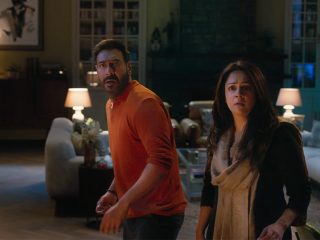Action B-movies or DTV films have a dedicated audience, and within the plethora of offerings, some rise to the occasion and hit the mainstream. One of them is Gerard Butler’s Plane, and another is Gerard Butler’s Kandahar. The idea is pretty sound.
Streaming services, too, have become the mecca for these action movies and thriller films to find an audience because mid-budget films find it harder to attain a space in the theatrical Rolodex. Now consider a genre of film like a plane hijacking, stretch it to over 7 hours of television, and have it be led by a charismatic actor who has the chops to deliver. If it were the early 2000s, this would have been a surefire success to the extent that networks would find any way necessary to continue this for over 8 seasons. The unique hook would be calculating the number of episodes according to the duration of the inciting incident of the season. For Kiefer Sutherland’s “24”, each season comprised a day; thus, each season had 24 episodes. For the Idris Elba-led Hijack, there are seven episodes dealing with the events of the Hijack due to the central conceit of the Dubai-London flight lasting seven hours. However, because the current scenario of the television landscape has changed and even “prestige” television is losing its sheen because of the glut of mediocrity arising due to many players in the streaming arena, a well-made, handsomely mounted old-school television show becomes a rarity.
Because it is an old-school television show, aside from the lead of the show, Sam Nelson (Idris Elba), has a broken home life, and his wife has an affair with another man, who turns out to be a detective in the police force. Sam’s son, on the other hand, resents the other man in his mother’s life. This is just one instance. There are other instances of supporting characters being introduced, both on the plane and on the ground, with backstories touched upon or fleshed out just a tiny bit, which could leave the viewers either interested or impatient to get on with the main story.
The hook of the main story occurs when the plane gets successfully hijacked and Idris Elba’s Sam has an opportunity to disarm the leader, but he instead chooses to side with the leader of the hijackers. This is enough to intrigue the viewers, as they learn that Sam is a negotiator and thus is perfectly capable of temporarily changing sides to fulfil a larger picture. In a post-9/11 world where the deviation of a plane from the flight plan by a mere 3 degrees or zigzagging on the flight plan is enough of a signal to ground control about a possible situation occurring, the writers are cognizant enough to not make a movie starring a Liam Neeson analogue, a soldier who can single-handedly take over the plane and beat up the hijackers. Instead, writers Chris Kay, Jim Field Smith, and Mo Ali craft a mostly pulpy yet grounded thriller where Elba’s Sam has to navigate and maintain communication with the passengers as well as the terrorists to maintain and ensure his and the passengers’ safety. Back on the ground, the ATC cell led by Zahra Gahfoor (Archie Panjabi) and the Flight Ground Control led by Alice Sinclair (Eve Myles) have to contend with both following the flight plan of the plane and also figuring out the motivations of the hijackers and whether it constitutes an international incident or whether the culprits are closer to home.
The questions do arise: are there moments that are cheesy or plot points being introduced that are completely implausible? Yes, there are, but they are introduced at the exact opportune moments to keep the pace and maintain the consistent tone of the show. There is also a risk of the events on the ground completely defusing the tension of the events occurring on the plane due to inevitable cross-cutting. However, “Hijack” is successful in ensuring that the events on the ground are compelling enough that they inform the moments on the plane.
Is it true that the actual motivation of the leader of the hijackers is suspiciously similar to Le Chiffre’s plan in the first act of 2006’s Casino Royale? Yes, it is, but it worked very well then, and it works here. It does stretch the limits of plausibility in exploring the tendrils of any organisation to lead a hijack or how to ensure that all the members of the hijacking team are expendable. But the show’s plotting is so strong that by the end of the 6th episode, a curveball comes out of nowhere, and when explained in the 7th episode, it does make sense. The 7th episode does try to resolve events a tad bit too quickly, which could have been allowed to breathe for a good 10 minutes more. The show also tries to explain the relative incompetence of the hijackers, which makes much more sense as the full show reveals itself and comes into sharper focus.
I am not pretending that this show is some sort of bastion of prestige television. It is the farthest from that. However, it is rare for a television show to know, understand, and structure itself as an actual television show, with cliffhangers, twists, and character developments (cheesy or otherwise) all within 48 minutes. In the current era of “content”, the television series being lambasted are the ones that forget the grammar of television and equate a longer runtime to the grammar of a movie, but are broken down into chunks of episodes. That could have worked, but it is not as simple as doing a hard cut and rolling towards the credits. The binge model has been successful not because a story was extended for over 7 to 8 hours and the viewers voraciously devoured every second. The binge model is successful because the best TV shows work as individual pieces as well as parts of an existing whole.
Hijack, in any other era, would be perfectly slotted into the mediocre television content, parallel to the direct-to-video action movies. Right now, though, a show managing to delve deep into its arsenal of old-school tricks and manage to inject a dopamine rush is such a lost familiarity that it automatically catapults this “junk food” content into almost gourmet food. It is exciting, taut, cheesy, and sometimes silly, but never boring, and manages to inject familiar twists and turns in places within the plot progression such that it still surprises the viewer. There is a propensity for the writers to provide closure to every ancillary plot thread introduced here, sometimes to its detriment, other times purely for shock value. But it does help that the show is carried by a talent like Idris Elba, who is good as the determined and calculated negotiator who can also appear emotionally vulnerable whenever necessary. And Elba sells the sincerity of the character, due to which the viewer roots for the character and is ready to follow this compelling plane ride.










